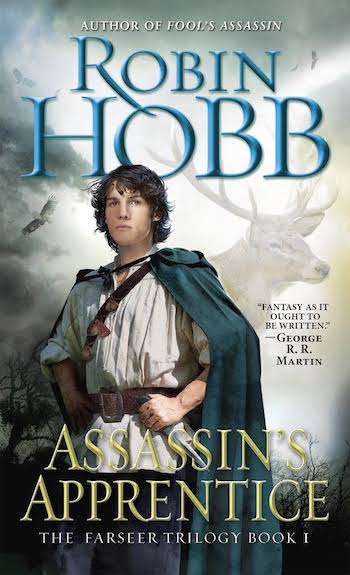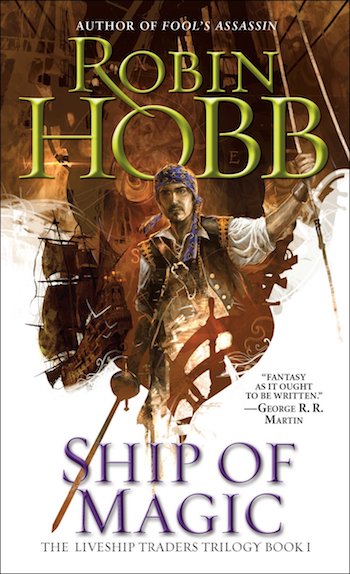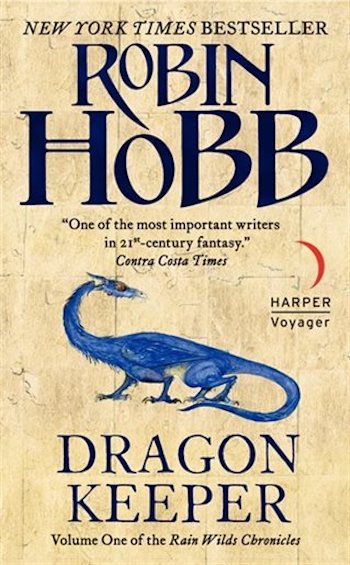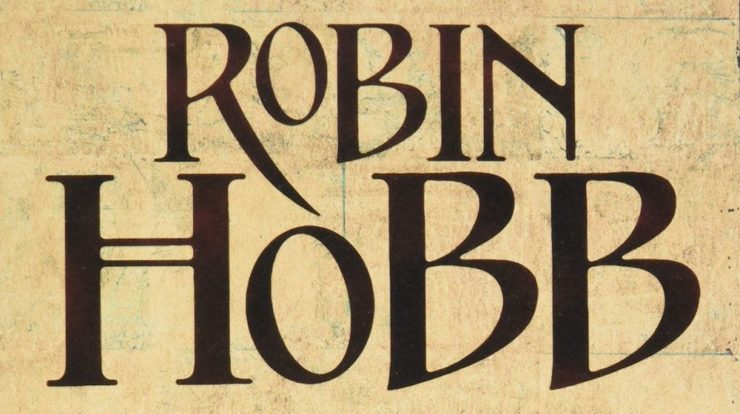Choosing a Robin Hobb book to start with isn’t just choosing a series—it’s choosing a doorway into a huge, interconnected world. All but one of Hobb’s trilogies make up a giant tale told in many pieces (the oddball is the Soldier Son series). They span continents and decades, damaging leadership and ecological damage, traumatic childhood and challenging coming-of-age.
And you can start in several places. If you’re a completist, you’ll probably start at the beginning, but if you’re not, you can choose based on character, or location, or focus. Would you like a young man with royal blood, or a headstrong young woman fighting to lead the family business? Prefer your dragon-centric tales set in a strange, deadly landscape? Would you like to explore a bustling port town in a series where family drama involves magical ships? Or do you like your fantasy set in castles and keeps, fully engaged with the foibles and flaws of royalty?
Where not to start is with Hobb’s completed series, Fitz and the Fool, which picks up with her most-beloved characters decades after they were introduced. The Fitz and the Fool books are differently paced and focused, a culmination of years spent with these two characters and their complex relationship. But if you’ve read the books leading up to this trilogy, the emotional payoff is considerable. So let’s get started.
If you want to start at the beginning: Assassin’s Apprentice, The Farseer Trilogy

At six years old, the boy who will come to be called FitzChivalry Farseer finds out he has royal blood. But this is no simple, happy story of secret prince; it’s the tangled, difficult story of a prince’s bastard who is too dangerous to be left alone, and too valuable to be killed.
Assassin’s Apprentice is a compelling read, but not an easy one. From Fitz’s broken magical bond with the young dog Nosy to the constant and horrible presence of Prince Regal, Fitz’s nasty half-uncle, things are not easy for our hero. He’s lonely and isolated, often insulted, if not outright threatened, and even his assassin mentor, Chade, is a mystery. (Chade is a delight: imagine a cantankerous Squib version of Dumbledore crossed with A Song of Ice and Fire’s Varys, but more willing to get his own hands dirty.) And I haven’t even mentioned the Forged, the semi-zombies ravaging the land in the wake of the attacking Red Ship Raiders.
Apprentice is very much the beginning of a story, and not a novel that really stands on its own; it leaves Fitz in a neighboring kingdom, recovering from another horrible attack, and with little to nothing resolved. But if you grow fond of Fitz—and I suspect you will, if you’re still reading—you will find him hard to leave behind. He’s deeply flawed, endlessly noble, full of doubt and prone to trouble. You will probably want to throw the book across the room at some of his eventual choices. But I can think of few characters I’ve followed so long—all the way into the middle age of Fool’s Assassin.
I picked up Assassin’s Apprentice when it came out because I grew up on epic fantasy and always wanted more—but also because Hobb is my college best friend’s mother, and curiosity had the best of me. But if curiosity started me on this series, the books themselves kept me going. Apprentice was the first book to ever made me miss my subway stop; more recently, Fool’s Quest made me cry on a plane. Be careful where you read these.
Buy the Book


Assassin’s Apprentice
If you want to start with pirates and ships: Ship of Magic, The Liveship Traders Trilogy

Far down the rugged coast from Fitz’s home in Buckkeep is the city of Bingtown, home to the Liveship Traders. Liveships are literally named: after three generations of sailors die on their decks, they “quicken,” becoming sentient beings with all the memories of their deceased family. Althea Vestrit was certain that her father would leave their ship, Vivacia, to her—but he doesn’t, passing it on to his elder daughter, Keffria, for her Chalcedean husband Kyle to command.
Chalded is not a nice place, but the slave trade has made it wealthy, and Kyle opts to use Viviacia as a slaver. He won’t let Althea sail on the ship until she proves herself as a sailor, so off she goes to work on the sea, where she encounters the delightfully named Brashen Trell, who used to sail on the Vivacia. With a name like that, you know there are romantic hijinks afoot—but that’s not what keeps Ship of Magic moving. Hobb builds a bigger world than just that of the relatively privileged Traders. A pirate named Kennit comes up with a plan to free slaves, turning them into freed crews for his fleet of pirate ships; Althea’s nephew, Wintrow, struggles with being forced to sail when he wants to be a priest; and, in a storyline that starts small but becomes huge in Hobb’s connected worlds, young, bratty Malta Vestrit deals with the fact that her life is not necessarily going to turn out exactly how she imagined it.
I adore Malta, eventually, but she’s unbearable at first. Her growth is one of Hobb’s most effective character transformations. Ship of Magic, like Assassin’s Apprentice, is very much part of a longer story, and like the Farseer Trilogy, its world just keeps growing, eventually encompassing the secrets of the sea serpents whose story is woven into that of the human characters. The ecology of Hobb’s world is thoughtfully built out, and all connected, sometimes in unexpectedly heartbreaking ways. In later books, you meet Paragon, a mad Liveship, and visit an island beach whose inhabitant I will never forget. There’s a little bit of overlap with the Farseer books—but more with the Rain Wild Chronicles, as only Liveships can sail up the magically polluted Rain Wild River.
Buy the Book


Ship of Magic
If you’re in it for the dragons: Dragon Keeper / Dragon Haven, The Rain Wild Chronicles

If you are impatient for your dragon-related books to get to the dragons already, start here; the Rain Wild series will spoil you for a few things about the Liveship Traders, but on the other hand, if you then read the Traders books, you’ll have a new perspective on the history of dragons (and on Malta Vestrit). The Rain Wild River spills into the sea near Bingtown, forming a natural barrier between it and Chalced that affects the region and its people. Rain Wilders come to Bingtown to trade, and they figure heavily in the Traders books, but the unstable landscape itself is a character here—and a constant threat.
The Rain Wild series follows a group of young people who are chosen to be dragon keepers, to accompany their charges on the (very likely one-way) journey to a lost city at the source of the Rain Wild River. One of them is Thymara, a young Rain Wilder girl altered, like so many of her people, by the toxic landscape. The keepers are accompanied by Alise, who enters a marriage of convenience in order to access the funds that will let her study dragons, and Leftrin, a barge captain who uses a piece of wizardwood (the material used in Liveships) to enable his vessel to travel the Rain Wild River.
The heart of this series is built on the dragon-keepers’ developing connections with their dragons, and the dragons themselves, weak, poorly formed creatures that lack their ancestors’ majesty and have only some of their ancestral memories. It’s been a long time since dragons were in the world, and these need human help. Their relationships are prickly, taut, sharply unlike like human relationships. The Rain Wild series ties together a handful of threads from Hobb’s other books—some incredibly satisfyingly, and some less so. The first two books feel like one book, and it’s hard, looking back, to remember where the line between them is; the arduous journey up the river takes a long time, and Hobb never shies away from the exhausting reality of traveling, hunting, dealing with other people—and dealing with dragons. This series is the most slow-burn of the three I’ve discussed here, but if you’ve read the other two, it does a lot to fill in the universe Hobb’s created, and to create a fantasy world where change, rather than tradition, takes hold.
Buy the Book


Dragon Keeper
Originally published in May 2017.
Molly Templeton grew up without a television, which maybe explains why she read so many doorstop epic fantasies as a teen. She can be found on Twitter.











Robin Hobb is my favourite author. I’ve been hoping for a long time that someone at tor.com would do a read / re-read of the Farseer universe.
Fitz and his adventures have made me tear up quite a few times. And you’re absolutely right about Malta, great character and one of the few that I’ve done an almost complete 180 on how I viewed. Kennit is an absolute masterpiece of a character as well.
I can only recommend starting from Assassin’s Apprentice and reading in release order. You would miss out on so many connections and reveals otherwise. I could see the argument for skipping the Rain Wild Chronicles and going from Tawny Man trilogy straight to Fitz and the Fool but there’s enough there to be worth it if you like the world.
@1 – Second the re-read idea. Actually, I came down to the comments to pitch it and you beat me to it :)
Tor, if you need a long-time devoted fan to do a re-read, I might be interested!
+1 read/reread
@austin: If I’m not mistaken, I read somewhere that TOR just waits for volunteers, so maybe you ought to contact the admins/?
Robin Hobb is the best storyteller I have ever encountered. She mesmerizes me with the characters, the action, and the depth of emotion in her stories. Within a few short passages I will be hooting with laughter and then devastated with grief.
My son is also a big fan. We have called each other in tears, because we need to be comforted by someone who shares equal investment in these characters who have become our close friends and who are dealing with love and loss.
I. Love. Robin Hobb.
These books make me cry like a baby. (My main squeeze Burrich though )
)
And honestly. I don’t even like Fitz that much. But the secondary characters in his story are just superb.
@@.-@ – Indeed? *runs chin* Hmmm…
I got the Liveship series on Audible and I loved it. I haven’t gotten to the others yet but her world is so detailed and vivid it pulls you in.
I love Robin Hobb and her books but she sure knows how to create an annoying character. By the very end Fitz was still annoying me with his fitzness while I was simultaneously cheering him on (and crying). Such a satisfying collection of books. Impossible to pick a favourite arc.
Love this series. And you should definitely reread Assassin’s Apprentice after reading the tawny man trilogy. Chapter 30 of fool’s fate gives new meaning to chapter 6 of Assassin’s Apprentice. Keppet, Keppet.
Aside from the never-explained homophobia among both the Traders and in the Six Duchies, I do enjoy this interrelated series.
(I read the four trilogies in what I think of as “in order”: Farseer, Liveship, Fool, and Dragon Keepers.)
The thing I have always admired about it is that in the Fool, Robin Hobb gives us a character whose gender we think we know but never do.
I’d like to make a plug for the ‘Soldier Son’ trilogy. Younger son destined for the military has experiences which are far beyond anything he was prepared for.
I second the above recommendation of the Soldier Son trilogy.
So thrilled to see this post! I picked up Assassin’s Apprentice on lunch break back when I was an assistant manager for B. Dalton’s and have spent the past 30 years absolutely entranced with Robin Hobb’s storytelling. As much as I’ve enjoyed many, many of the other series and authors featured here on Tor.com, I can honestly say that none of them have reached the bar set in my mind by the Farseer Saga.
nice version
Out of all the books I’ve read, I don’t think I found an author that can convey such crushing, heartbreaking, uplifting, joyous emotions as Robin Hobb. I also love that her books inspired the Within Temptation song Hand of Sorrow.
Robin Hobbs also published several books as Megan Lindholm earlier in her career, as well as a “joint” short story collection including works under both names. Seem to mostly be out of print, but they are worth tracking down – I particularly liked Wizard of the Pigeons and Cloven Hooves, both urban fantasy type works (or maybe Cloven Hooves should be called rural fantasy?) They have the trademark heartrending emotional arcs, though condensed into much shorter, standalone works.
I’ve just come back to Ms. Hobb after a lengthy absence (I read Farseer about 5 years ago). I finished Ship of Magic yesterday, and can’t get it out of my head! She has such skill with building interesting characters that behave in realistic ways! I won’t be starting The Mad ship for a month or two, but I’m looking forward to continuing the adventure.
I have been reading and rereading Robin Hobb and Megan Lindholm for the last 15 years. I love all of her books but cannot find a copy of Wizard of Seattle anywhere. At least not one I can afford. I am hoping it will be rereleased. No one tells a story so well. Her characters can exasperate the crap out of me but still I love them. Absolutely magical and sad and exciting and and ……
I imagine there are still stories to tell so I will hope.
Thank you Robin for transporting me with your words.
I just finished rereading the Farseer trilogy yesterday and will be diving straight into the Liveship trilogy today. I started reading these books on their initial publication and have re-read them several times but never in order. I was waiting for the end of the Elderlings series before doing that.
I’ve already seen new connections to the eventual fate of Fitz and the Fool: it was all there in the Farseer books! But, like the prophecies of the White Prophets, you don’t see those connections until they happen.
It is a joy rereading, this time in order. I love Fitz, despite his Fitzish ways, also Nighteyes and the Fool. Kettricken, Verity and Burrich are role-models in nobility and integrity while Galen, the false coterie and Regal are immensely satisfying villains (I always felt sorry for Burl though, he wasn’t as awful as the others). Perhaps I’ll appreciate the Rain Wild Chronicles more this time. I felt it was the weakest of the series, not quite up to RH’s usual stellar standard. Still way ahead of most other fantasy authors though.
I wonder what RH’s next story will be? How will she follow up on such magnificence? I’d really like the series to continue with Bee, annoying little madam that she is just like her pa… imagine her wit-bonded with a dragon… But that is probably hoping for too much and I expect RH could do with a change. One thing is for sure, whatever she writes next I’ll be buying it!